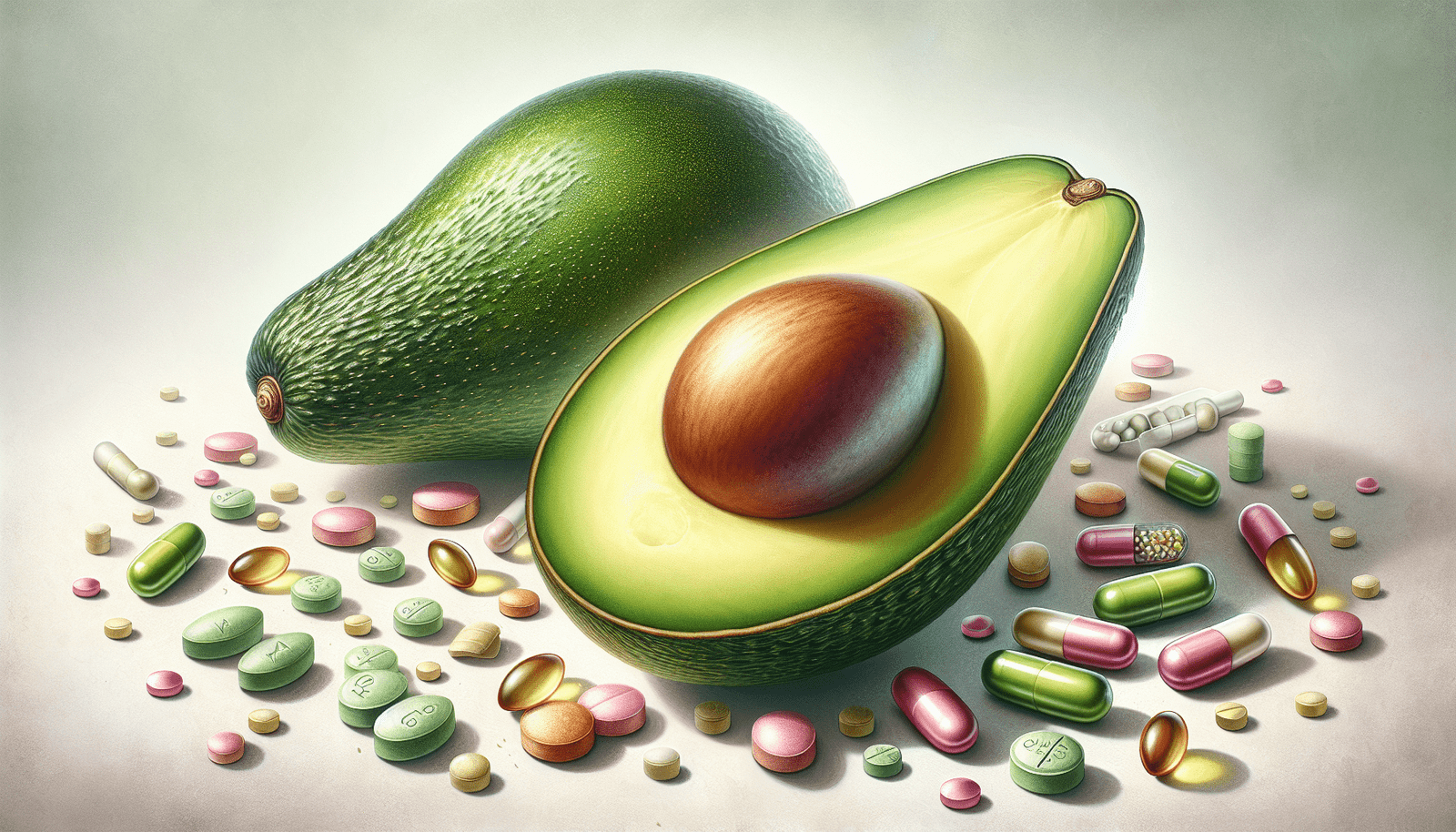Have you ever wondered if the creamy, delicious avocado that you’ve been incorporating into your meals might interact with the medications you’re taking? It’s a valid concern, given how much we rely on various foods to support our health. Let’s unravel this together.
Understanding Avocado: A Nutritional Powerhouse
Avocados are far more than just a trendy source of healthy fats. They’re rich in nutrients, vitamins, and minerals that are vital for your overall well-being.
Nutritional Content of Avocado
When you think of avocados, the first thing that often comes to mind is their high-fat content. But the fats in avocados are primarily monounsaturated fats, which are heart-healthy. Here’s a quick overview of what you get from a typical avocado:
| Nutrient | Amount (per 100g) |
|---|---|
| Calories | 160 |
| Fat | 15g |
| Carbohydrates | 9g |
| Fiber | 7g |
| Protein | 2g |
| Vitamin K | 26% of the RDI |
| Folate | 20% of the RDI |
| Potassium | 14% of the RDI |
| Vitamin E | 10% of the RDI |
This outstanding profile makes avocados a fantastic addition to a balanced diet. But how do these nutrients impact your health, especially in relation to medications?
The Interaction Between Avocado and Medications
When it comes to dietary choices and medication interaction, avocados can behave differently than you might expect.
Common Medications That Interact with Avocado
Certain medications have known interactions with foods that are high in fats or potassium. Let’s clarify which groups of medications could potentially respond to your avocado intake.
Blood Thinners
If you’re taking blood thinners, you’re possibly advised to monitor your intake of vitamin K, as it plays a crucial role in blood coagulation.
- Warfarin (Coumadin): This is the most notable blood thinner that interacts with vitamin K. Avocados contain a fair amount of this vitamin. The key here is consistency; it’s not that you need to eliminate avocados altogether, but rather keep your consumption steady.
ACE Inhibitors
Medications like lisinopril and ramipril, used for controlling blood pressure, can also interact with high-potassium foods.
- Avocados are rich in potassium, so if you’re taking an ACE inhibitor, it’s important to monitor your potassium intake. Always keep your healthcare provider in the loop regarding your diet changes.
Statins
If you’re prescribed statins to manage cholesterol levels, you might want to be cautious about your avocado intake.
- Though there haven’t been direct studies linking avocados to statin effectiveness, the high-fat content could potentially lead to misinterpretation of cholesterol levels if not monitored appropriately.
How to Manage These Interactions
Managing these interactions doesn’t mean that you should avoid avocados entirely. Here are some tips to keep your health in balance:
-
Consult Your Healthcare Provider: This is your best starting point. Always inform them of your dietary habits and any changes.
-
Keep Portions in Check: Enjoy your avocados in moderation. As with many things in life, balance is key.
-
Stabilize Your Intake: If you love avocados, make them a regular part of your diet rather than sporadic. This helps your body adapt and maintain consistent vitamin levels.
-
Track Your Symptoms: If you notice anything unusual after consuming avocados while on medication, take note. Discuss these observations with your healthcare provider.

Understanding Potassium: Avocado’s Hidden Element
With its high potassium content, it’s essential to understand why potassium matters, especially if you’re on certain medications.
Why Is Potassium Important?
Potassium plays a crucial role in heart health, kidney function, and neurological activity. Keeping your potassium levels in check is vital, as both low and high levels can lead to significant health issues.
Recommended Potassium Intake
The recommended daily intake for potassium is about 4,700 mg for adults. To help visualize how avocados fit into your daily routine, consider the following:
- A medium avocado contains about 975 mg of potassium.
Here’s how it stacks up against some other foods:
| Food | Potassium Content (mg) |
|---|---|
| Banana (1 medium) | 422 |
| Sweet potato (1 medium) | 542 |
| Avocado (1 medium) | 975 |
| Spinach (1 cup, cooked) | 839 |
Enjoying an avocado can significantly contribute to your potassium needs, but just be cautious with your overall intake, especially if medication puts you at risk for hyperkalemia (high potassium levels).
Food Choices and Their Effects on Medication Absorption
Did you know that certain foods can influence how medications are absorbed in your body? This means your perfectly blended avocado smoothie could alter the effectiveness of your daily meds.
Grapefruit: A Notable Mention
To highlight how food interacts with medicine, grapefruit deserves a mention. While not directly related to avocados, it’s a prime example of foods that can affect medication absorption.
The Grapefruit Effect
Certain compounds in grapefruit can inhibit enzymes that break down drugs in your body, leading to an increase in drug levels. If you’re on medications like statins, this could potentially lead to adverse reactions.
How Avocados Fit In
Unlike grapefruit, avocados primarily serve as a nutrient-dense food without known direct effects on medication absorption. They’re wonderfully versatile and can be included alongside your meals without the same level of concern.

Considerations for Specific Health Conditions
If you have specific health conditions, you might need to be more mindful of your avocado consumption.
Heart Conditions
Avocados can be beneficial for heart health, thanks to their monounsaturated fats and potassium content. However, if you’re on medication for blood pressure or clotting, as previously mentioned, moderation is key.
Kidney Issues
For individuals with kidney issues, potassium intake is crucial. Avocados might be off-limits if you have conditions like chronic kidney disease (CKD).
Making dietary adjustments can be complex, especially when taking into account your medications. Always consult your healthcare provider before making any significant dietary changes.
Diabetes
If you’re watching your blood sugar levels, avocados can be a good choice due to their low carbohydrate content and high fiber. They can help control blood sugar spikes and provide sustained energy.
Avocado: A Culinary Gem
Beyond health considerations, avocados are a glorious culinary ingredient that can easily fit into a wide variety of dishes. Embracing their versatility can enrich not only your diet but your overall experience of eating.
How to Incorporate Avocados into Your Diet
Here are a few fun suggestions for how to enjoy avocados while being mindful of potential interactions with medications:
-
On Toast: Smash some avocado on whole-grain bread for breakfast. Top it with a sprinkle of salt and pepper, or even a poached egg for extra nutrients.
-
In Salads: Toss avocado cubes into your favorite salad. They can add creaminess to otherwise crunchy bites.
-
In Smoothies: Blend avocado into smoothies for a creamy texture. It pairs wonderfully with bananas and leafy greens.
-
Dips and Spreads: Whip up some guacamole or avocado dip for snacking. Pair it with fresh vegetables to keep it healthy.
Cooking Tips
When cooking with avocados, remember that their nutritional value can be enhanced when paired with other foods. For instance, combining them with tomatoes can improve your body’s absorption of certain nutrients.
The Bottom Line
If you’ve been wondering about how avocados interact with your medications, you’ll find that while they can be a nutritious part of your diet, there are important considerations to keep in mind. The key is awareness and moderation.
It’s essential to maintain open communication with your healthcare provider about your dietary habits and any changes you consider making. With the right approach, you can enjoy your avocados while ensuring your health remains intact.
Next time you reach for that green fruit, remember that you’re not just nourishing your body but also engaging in a thoughtful balance of health and enjoyment. Happy eating!

